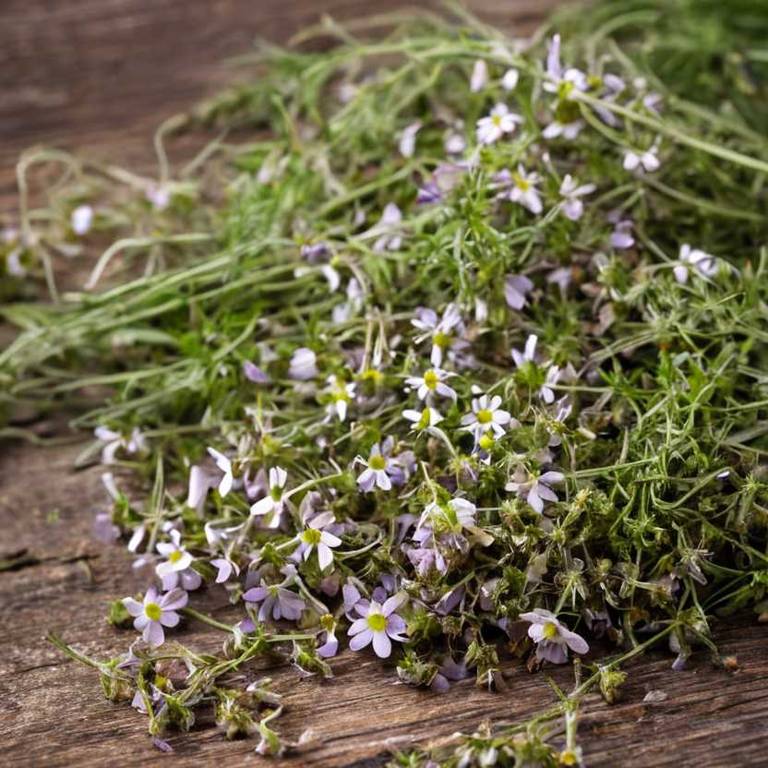Euphrasia (Euphrasia officinalis)
Euphrasia (Euphrasia officinalis) is a member of the Scrophulariaceae family, native to Europe, Western Asia, and North Africa. Traditionally, its leaves, flowers, and bark have been used for infusions, decoctions, and tinctures.
This herb is particularly valued for its anti-inflammatory, astringent, and bitter actions, and has a long history of use in european herbal medicine, mediterranean herbal traditions, and japanese kampo medicine.

Quick Facts / Key Information
| Common Name | Euphrasia |
|---|---|
| Scientific Name | Euphrasia officinalis |
| Plant Family | Scrophulariaceae |
| Genus | Euphrasia |
| Species | officinalis |
| Native Range | Europe, Western Asia, North Africa |
| Plant Parts Used | Leaves, Flowers, Bark |
| Primary Medicinal Actions | Anti-Inflammatory, Astringent, Bitter |
| Primary Traditional Systems | European Herbal Medicine, Mediterranean Herbal Traditions, Japanese Kampo Medicine |
| Historical Preparation Methods | Infusion, Decoction, Tincture |
Botanical Identity
- Scientific Name
- Euphrasia officinalis
- Common Name
- Euphrasia
- Synonyms / Alternative Names
- Common Eye, Eyebright, Common Eyebright
- Plant Family
- Scrophulariaceae
- Genus
- Euphrasia
Botanical Description
- Growth Habit
- Perennial herbaceous plant.
- Height
- It typically grows to a height of 10 to 30 centimeters.
- Leaves
- Simple leaves with entire margins, upper surface pale green to dark green, lower surface lighter green, possessing distinct stomatal bands along the midrib.
- Flowers
- Small, actinomorphic flowers with five yellow petals and five white stamens arranged in a spike, bearing two lobed sepals and a bilaterally symmetrical ovary.
- Stems
- Erect, unbranched, glabrous, angular, herbaceous, with nodes and internodes, and opposite leaf arrangement.
Traditional Uses / Historical Use
Traditional Systems
- European Herbal Medicine
- Mediterranean Herbal Traditions
Historical Preparation Methods
- Infusion
- Decoction
- Tincture
- Poultice
Medicinal Actions
- Anti-inflammatory
- As described in traditional systems, a moderate anti-inflammatory, in tissue-soothing contexts.
- Astringent
- Historically regarded as a cooling astringent, for surface-level applications.
- Bitter
- In herbal literature, noted as a calming bitter, in bitter herb groupings.
- Tonic
- Traditionally described as a mild tonic, for foundational support.
Active Compounds
- Flavonoid
- Plant-based polyphenolic compounds frequently distributed throughout aerial plant parts.
- Tannin
- Naturally occurring polyphenols widely distributed in woody and leafy plant parts.
- Phenolic Acid
- A class of aromatic plant compounds commonly found in leaves, seeds, and stems.
- Glycoside
- Plant-produced compounds commonly stored in inactive glycosylated forms.
Modern Research Overview
Contemporary research on this plant includes areas such as chemical analysis, laboratory-based studies, and observational research. Detailed summaries of published findings are not included at this stage and will be added during future content updates.
Safety & Contraindications
- General Precautions
- Specific general precautions associated with this herb have not been well documented.
- Contraindications
- Specific contraindications associated with this herb have not been well documented.
- Allergies
- Information regarding allergic responses to this herb is limited.
- Drug Interactions
- There is insufficient evidence to determine whether this herb interacts with pharmaceutical drugs.
- Toxicity
- Available information regarding the toxicity of this herb is limited.
- Pregnancy & Breastfeeding
- There is insufficient evidence to determine the safety of this herb during pregnancy or breastfeeding.
Preparation & Usage Methods
- Infusion
- A preparation method involving steeping plant material in heated water for a short period.
- Decoction
- This method uses sustained heat to extract compounds from firm plant structures.
- Poultice
- This method uses direct contact between plant material and the skin.
- Tincture
- A preparation involving soaking plant parts in alcohol for extended extraction.
- Extract
- This method isolates plant compounds using alternative solvents.
Growing, Harvesting & Storage
Growing / Cultivation
- Soil
- Prefers loamy soil with moderately well-drained conditions. Typically grows best in organically rich soils.
- Sunlight
- Thrives in partial shade. Tolerates full sun to partial shade.
- Watering
- Prefers moist soils. Tolerates variable moisture levels.
Medical Disclaimer
The information provided on this page is for educational and informational purposes only. It is not intended to diagnose, treat, cure, or prevent any medical condition. Always consult a qualified healthcare professional before using any herb for medicinal purposes.